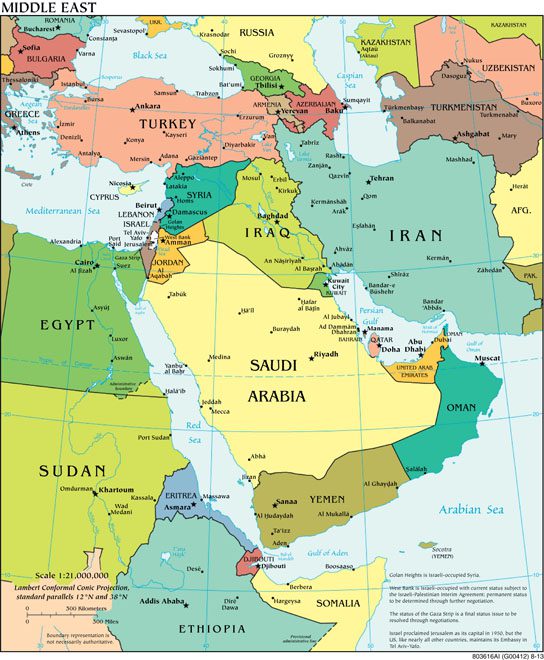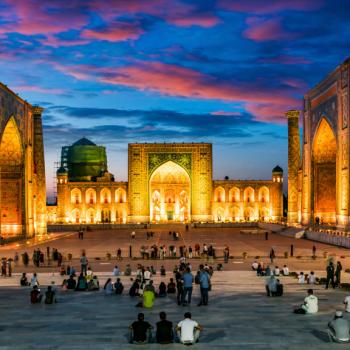
(Wikimedia Commons)
Yet the Qur’an does not bring any new truths. It does not claim to do so. It is merely a restoration of those truths that had been revealed from the beginning. It carries forward what was written in the books of Abraham and Moses, confirming the earlier scriptures and particularly the Torah and the gospel.[1] “Nothing is said to you,” Muhammad is told, “that has not been said to other Messengers before you.”[2] In fact, the Qur’an addresses the heirs of the former prophets, the Jews and Christians of Muhammad’s day, directly: “People of the Book! Our Messenger has come to reveal to you Our will after an interval during which there were no Messengers, lest you should say: `No one has come to give us good news or to warn us.’ Now a prophet has come to give you good news and to warn you.”[3]
When the Christians and the Jews rejected Muhammad’s prophethood, the Qur’an announced that it was a restoration of the faith of Abraham, who was an “excellent example” for the believers.[4] “Follow the religion of Abraham!” it told them.[5] Thus, the religion of Islam is seen to be the true religion of God, the religion revealed to Abraham before human invention and rebelliousness gave rise to the historical deviations known as Judaism and Christianity. “Abraham was neither Jew nor Christian. He was an upright man [hanif], one who had surrendered himself [muslim] to God. He was no idolater.”[6] Why should Muhammad or his followers give up the pure truth that had come to them from heaven in exchange for muddy and impure traditions of men that only vaguely and distantly recall their divine origin?
Who but a foolish man would renounce the faith of Abraham? We chose him in this world, and in the world to come he shall dwell among the righteous. When his Lord said to him: ‘Submit [aslim],’ he answered: “I have submitted [aslamtu] to the Lord of the Creation.”[7]
Abraham, says the Qur’an, had prayed for the coming of Muhammad.[8] Thus, the Qur’an gives Muhammad a place in the long and distinguished line of Semitic prophets.
We have revealed Our will to you as We revealed it to Noah and to the prophets who came after him, as We revealed it to Abraham, Ishmael, Isaac, Jacob, and the tribes; to Jesus, Job, Jonah, Aaron, Solomon and David, to whom We gave the Psalms. Of some Messengers We have already told you (how God spoke directly to Moses); but there are others of whom We have not yet spoken: Messengers who brought good news to mankind and admonished them, so that they might have no plea against God after their coming.[9]
Muhammad may be the last of the prophets in Muslim belief, but he was certainly not the first. Thus, fragments of God’s truth remain scattered about the world, owing to the earlier ministries of divinely-sent messengers. Judaism and Christianity are included in this view. Because, although they are encrusted with heresies and innovations, Judaism and Christianity are essentially divine, adherents of the two faiths are given a divine assurance of salvation if only they will remain faithful to the fundamental truths of their religions:
There are among the People of the Book some upright men who all night long recite the revelations of God and worship Him; who believe in God and the Last Day; who enjoin justice and forbid evil and vie with each other in good works. These are righteous men; whatever good they do, its reward shall not be denied them. God knows the righteous.[10]
Believers Jews, Christians, and Sabaeans, whoever believes in God and the Last Day and does what is right—shall be rewarded by their Lord, says the Qur’an. They have nothing to fear or to regret.[11]
[1] 2:91; 3:3; 4:47; 5:48; 6:92; 10:37; 12:111, 35:31; 46:12, 30. For the books of Abraham and Moses, see 87:18-19.
[2] 41:43.
[3] 5:19.
[4] 60:4; compare 3:95.
[5] 3:95.
[6] 3:67. The last phrase of this quotation may possibly be a veiled criticism of the Christians of the day, with their Trinity and their icons.
[7] 2:130-31.
[8] 2:129.
[9] 4:163-65.
[10] 2:62; compare 2:112; 5:69; 22:17.
[11] 89:22. The very notion that the Lord can “come,” that he can change location, is just one of many ideas in the Qur’an that point to an originally anthropomorphic view of God—a view that attributed bodily form to him—within Islam.












